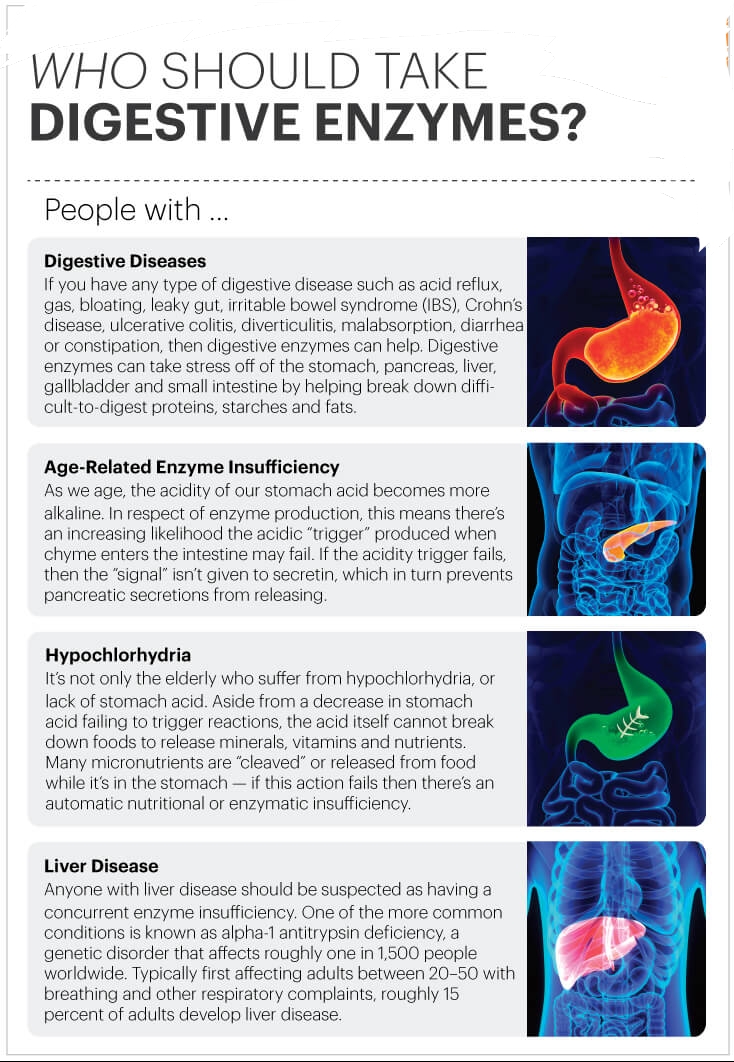Nutrition, Physiology
How Food Gets Digested and Surprising Reasons to Take Digestive Enzymes
GUT HEALTH.
Making sure you have good gut health is important, even if you don’t have digestive symptoms. When gut health becomes impaired, it usually means your body isn’t digesting food properly or fully. Improper digestion can create a chain-reaction of imbalances in the body, which can create or exacerbate many seemingly unrelated health issues. That is why, when I see signs of impaired digestion in a patient, I often recommend they use digestive enzymes to give their body the support it needs to come back into balance.
In this article, I will briefly explain how the digestive system works, and discuss eight common health issues – most of them NOT apparently originating in the gut – and how using digestive enzymes can often be the first step to getting well again.
QUICK LESSON: How Food Gets Digested
Think of the intestines as a tube running through our body. In order for nutrients to get into our bodies, food must be digested fully, all the way down to amino acids (from protein), lipids (from fat), glucose (from carbohydrates), and nutrients, which are tiny enough to go through the intestinal cells, traverse over to blood vessels, and be delivered to the liver and all other cells in your body.
Starting in our mouth, food is partially digested by enzymes. When this partially digested food reaches the stomach and small intestines, it is further digested in different ways:
- Proteins are digested by stomach acid(hydrochloric acid).
- Fats are digested by bile made by the liver and secreted from the gall bladder into the small intestine.
- Carbohydrates, proteins, and fats are further digested by pancreatic enzymes (i.e. enzymes made in the pancreas) with names ending in “-ase” (e.g. amylase, protease and lipase).
- Cells lining the intestines also make enzymes, to complete one last step of digesting carbohydrates (from fruits, vegetables, and grains) inside our intestines so they can travel across the intestines cells to get inside our bodies.
When your digestion is impaired, you may need support in some of the areas listed above. But not all of these substances are recommended for everyone. Hydrochloric acid, for example, can cause heartburn, or burning in your throat, if you already have enough, and excess bile can cause digestive upset. Thus, it’s best not to take these unless your naturopathic doctor tells you that you really need them (usually based on a specialty stool panel).
Taking supplemental pancreatic enzymes* is different. They don’t cause burning or digestive upset. Your body does not become dependent on them, and they do not inhibit your body’s natural production of enzymes. They simply help ensure that all the food you eat gets digested (or as much as possible).
That said, the goal of taking digestive enzyme supplements is NOT to take them forever, but to use them as a means of supporting your body so you can recover from your health condition.
 What Health Issues Can Improve by Taking Digestive Enzymes?
What Health Issues Can Improve by Taking Digestive Enzymes?
While just about every health condition under the sun can be affected by (and affect) digestion, I have found eight specific heath areas that respond positively when the patient takes digestive enzymes. Note that only two of them are “obvious” digestive complaints:
- Stress (emotional, mental, or physical)
- Irritable bowel syndrome (IBS), bloating, gas, constipation, and/or diarrhea
- Leaky gut, food sensitivities
- Chronic fatigue, pain, fibromyalgia, migraines
- Anxiety, low mood, sleep issues, memory changes, brain fog
- Autoimmunity
- MTHFR and methylation issues
- PMS, abnormal pap, and/or fertility issues
In the following sections, I will take you through each of these health issues and explain how and why digestive enzymes can often provide necessary support to help your body rebalance and

